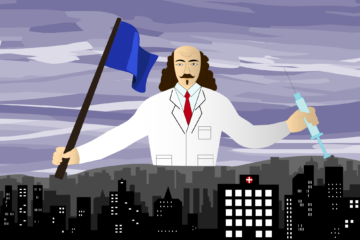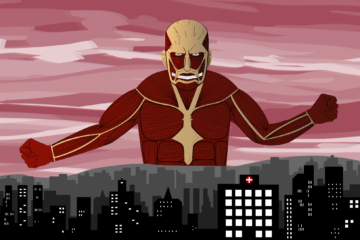While face masks have become emblematic of the past two years and the symbol of restrictions, their casual improper donning around the chin has also marked the growing restriction fatigue. The discrepancy between face masks and ‘chin diapers’ marks the gap between the laws that we, as a society, declare, and our commitment to them as private individuals.
Human coexistence therefore seems to hinge – not on a strict commitment to laws – but rather on an even stricter unwritten code of knowing precisely when those laws can (and should) be broken, so that they can persist while appearing to remain unbroken. Facing the manner by which we seem to declare inviolable laws while also improvising mannerly ways of violating them, we are called to seek the ancient wisdom of Socrates for a critique.
“How are you?” “Yeah, good morning to you.”
It happens often that ‘rational’ people evoke common sense and ask the seemingly oblivious defectors wearing chin diapers, “Why are you wearing the mask in that manner? Do you think it will work like this?”. And obviously they have a point. When masks were first created, their design corresponded precisely to the original intended use. But now, it appears for common sense, that some people have forgotten this link. The defectors seem be (mis)using the object while not knowing or not appreciating its intended purpose.
The disgruntled complaint of common sense is, therefore, that some parts of the population cannot be reasoned with, because they are not logical.
But the certainty and confidence provided by being logical is easily dissolved when one tries to apply it from the minority position. Let me explain with example that could happen in most ordinary situations.
Imagine you’re rushing to a work meeting, when by chance you run into a colleague whom you casually ask how she’s doing. But, in total defiance of conventions, she answers, “You know, funny you should ask”, forcing you to stop and listen. “I have been going through a bit of a rough patch recently. It took me a while to get to understand these feelings and I’m still exploring them. I think it’s mostly anger, probably at the world as a whole. Although I do think our boss is lately being a bitch, and it’s not helping….”.
Somebody would eventually pull this colleague to the side and tell her to mind what she says. In other words, she should have just followed the protocol and said ‘good morning’, instead of answering your question. But, her reply, adamantly logical, could very well be “Then why did you ask me the question in that manner? Don’t you know the meaning of what you said?”.
At this point, it becomes less clear who the defector is. On the one hand, the ‘reasonable’ colleagues have defected from the logical use of semantics. But on the other hand, the brazen colleague, who is in the minority, has defected from the unwritten rules of communication.
Metonymy
If we agree that ‘how are you?’ actually means ‘good morning’, then our communication can remain logical. But if we do not recognise the metonymy taking place (i.e. the switching of one symbol for another) then it becomes very easy to misconstrue the statements made by others as illogical. And this is especially so from the self-assured position of being part of the majority, or part of a closed community.
Therefore, we can agree that logic is not the question here. What rather concerns us is the misrecognition of metonymy occurring when one takes their position as fundamental.
In other words, when one fails to recognise that other understandings exist, and that the rules we apply in language are arbitrary and contingent to practical necessities. For example, ‘how are you?’ evolved into the implication of ‘good morning’ due to the necessity of brevity and, most of all, of maintaining a comfortable emotional distance from our acquaintances and colleagues.
The crux is that, in order for us to communicate, we have to assume that the rules of language are fixed. This is why the most annoying – and traumatic – thing for the majority, especially the pragmatic individuals, is an encounter with a Socratic person.

“What do you mean? Do you wish me a good morning, or mean that it is a good morning whether I want it or not; or that you feel good this morning; or that it is a morning to be good on?”
The Socrates would reply to the greeting by asking another question “but what do you mean by ‘how are you?’”. He therefore brings metonymy to the surface and starts a meta-discussion which, naturally, means that we have to stop acting – even almost stop talking – in order to revalue and re-establish the rules by which we want to talk and act.
Empty Gestures
At this point, we have to recognise the obligation to wear masks in public for what it is: a man-made and arbitrary rule (like any other rule). In this case, wearing a chin diaper is the defection from the official majority position that is given consent. As defectors, the ones wearing chin diapers are asked the question “Don’t you know?”.
Yet as already discussed, in society we wear chin diapers constantly and all the time, without even realising. Wearing a chin diaper is the nod of the head to the same Law which is meant to be violated. Hence, the rise of such defections, is nothing more than a sign of a waning support for the rule.
At this point, we can investigate defection in its earliest stage of its metamorphosis: Empty gestures.
During the pandemic, we’ve all seen (or perhaps even performed) such acts as pretending to smoke a cigarette or holding onto an empty coffee cup, in order to conform with the permissible exemptions to following the rule, while in fact breaking it. We don’t wear the mask but in the eyes of the law we seem as if we do.
In performing the empty gesture, one can disobey the Law while still making a conscious effort to conform with its explicit demands. The subject keeping up appearances is one who lost faith in the Law, but is still, ironically, committed to it for pragmatic reasons (to get things done) or perhaps for the sake of sanity (for things to make sense).
The empty gestures therefore allow the less brave among us to break the rules while remaining officially compliant with it; I should care about you, so I perform the act of asking about your well-being, but I expect you to not answer it truly.
Drawing the line
Due to the order’s dependency on empty gestures, every rule, such as that of wearing face masks, reaches a point at which the majority of the population gives the tacit consent to it, but also, a majority strays from what the law actually demands of them. In other words, social order seems to find a balance between what is expected of individuals, and the big chunk of those rules that can be ignored and transgressed when out of the line of sight of surveillance or enforcement.
From the medical point of view, there should be no question as to whether one should wear the mask to reduce transmission. But upon being implemented in the rules of society, the implementation of the simple notion of protective equipment becomes much less obvious. General rules have to be made by drawing many arbitrary (and therefore inconsistent) lines, which the individuals will find themselves following in situations that do not always make sense.
We wear masks as a barrier for the virus, but is the virus right here? Why should I wear a mask when no one is around? Why didn’t we have to wear a mask this time last year? Why are people allowed to take them off in restaurants, or in other countries? Why do we have a curfew? Why are the vaccinated allowed free travel if they can carry the disease just the same? And so on…
It is not about denying that these regulations have some rationale behind them. It is rather the case that the rationale involves necessary sweeping assumptions that cannot be applied universally but which nonetheless must be declared as such.
The brutally honest answer would of course be that if we did not set limits, human selfishness would take over, thus unravelling a chaos. But we cannot make such a statement, because society itself is built on the Noble Empty Gesture that says we are benevolent to each other and therefore can coexist. Without such gesture, all agreements would lose legitimacy, and so we draw a line and call it the Law.
The reason why the pandemic makes for an interesting case study on the nature of human laws, is that it happened so suddenly, that we could witness the arbitrary nature of making laws happening in the span of a few weeks if not days. This, of course, contrasts with the consensus-building process of Law, which generally takes years at the least or easily an entire generation. So much so that most of what we know as norms of the Law is already there when we are born.
But this time, the ways in which we interact, trade with and also impose demands upon each other, underwent some radical shifts that did not permit us the complacency with which we usually accept the norm. While the practical matters can quickly adapt and accommodate the radical change (as happened during the pandemic), the Law’s use of metonyms cannot evolve as quickly, mainly due to our common pretension that the Law is a result of the unchanging and fundamental social nature of humans, and not the product of pragmatism. In other words, we pretend that ‘how are you?’ meant ‘good morning’ since it was first used.
As a result, the hastily redrawn social order left bigger cracks in the new line that was drawn, and therefore a higher portion of defectors.
What would Socrates do?
The cracks in a social order are precisely a call for a revaluation or re-anchoring of the ideas around a new central grand idea (until that eventually collapses once again). The cracks in the pandemic response have already shone too radiantly, meaning that revaluation is not a matter of if, but how.
The pertinent question that thus concerns us is, which attitude towards the Law is the most suitable in order to bring about this revaluation? As we’ve seen, our choice ranges from piety, to empty gesturing, all the way to defection. Whether we like it or not, while we exist in a society we are forced to pick one. But which?
Let us then try and make this choice with as little misrecognition as possible. Let us start off from the most naïve position possible: that of Socrates, who asks for the meaning of the presented choices. I am thus entertaining the question ‘what would Socrates do?’.
We earlier mentioned that Socrates would ask the one implementing the Law “what do you mean by it?”. But this meta-question is only the first part of Socrates’s method. The Socratic dialectic does not consist of simply asking a series of ‘what do you mean?’ until the other person is driven crazy or is pissed off.
Socrates’s first question asks for a definition, but the next step is precisely to take that definition very seriously and apply it piously to the world. The intended result would be, of course, that the Law being employed, generates a number of inconsistencies that demonstrate its own falsity. In this sense, we could even say that Socrates was the first philosopher of language, albeit in a different sense to what is understood contemporarily.
What the Socratic act entails is what Žižek calls ‘overidentification’ with the proposed Law. The proper act of dissent is not to simply protest against the measures, especially when such protests take the form of sterile lamentations on social media and with friends.
A dissenter is not one that protests against the rules in the morning and then silently breaks them in the cover of night. On the contrary, what those who were against the pandemic measures should have actually done is to take the Law very seriously (to overidentify) and to compel everyone to follow it, with a radical piety of policing one’s own neighbours and passers-by.
In doing so, these pious dissenters would have prevented the existence of a sizeable segment of the population which gives its consent to Law only because covering the tracks of their transgressions (with the use of empty gestures) takes less energy than actually resisting. This segment would like for the restrictions to stop but it’s simply not worth the hassle.
Socrates is therefore precisely what denies this position, forcing the individual to take a stance.
Don’t cover it, but don’t destroy it either. Face it.
The Socratic position is understandably hard to accept because of our contemporary popular understanding of freedom. The latter is obsessed with the identification of constraints which is then to be followed by a passage à l’acte, an explosion of liberation and emancipation. But what usually happens is that these explosions are inert or of very limited radius, so much that the next day everything seems to revert to the stoic status quo.
Through this explosive process, whether religious terrorists or civil-rights movements, any progression towards freedom is typically carried out by a series of individuals who detonate their own well-being “at the service of freedom” until their message at some point gets through. In fact, I did not call the former ‘religious fundamentalists’, not because they are not, but because the latter are equally fundamentalists, i.e., they believe in fundamental individual rights. Fundamentalism, in this case, is congruous with misrecognition, i.e. the inability to perceive the metonymy taking place in language.

The anti-restriction protests were a direct representation of the obsession on passage à l’acte.
Image Source: abc.net.au
This explains why it seems somewhat ironic to the collective gaze, if not ridiculous, when a person is seen protesting against some restrictions while they themselves follow those restrictions. For our contemporary understanding of freedom, we see these people as spiritually undermining their own cause due to their not engaging in some self-immolating act of resistance that would eventually bring about their incarceration. It is perhaps true that freedoms can only be obtained by means of explosions, but our fixation on this spectacle also distracts us from the stage that must necessarily precede it: the overidentification with the Law.
The synthetic change that would redefine liberty, therefore, can only be attained as a result of a clash between two contradictory internal identifications (with Law and with Liberty). In this sense, the ridiculous person we see on our screens, protesting law while obeying it, undergoes this tense process, whereas the stoic person who brings down the mask back to their chin as soon as they are no longer caught on camera, is precisely one who avoids the conflict and takes the pragmatic approach.
Socrates as the Tragic Hero of Dialectics
It is trough this tension that we can understand why Socrates felt it necessary to embrace the death penalty that his Athenian society imposed on him. Had he made a recourse to feigning atonement or escaping from the city, he would have rendered his protest sterile and confirmed that the Law is meant to be broken (discretely) and that freedom is there to be infringed. In other words, his protest would have been merely against some laws which make no real demands anyway. His message, particularly critical of his society’s inherent hypocrisy – i.e. the empty gesturing of the Sophists – would have been undermined.
Socrates’s strategy was to call the bluff of his society. Through his piety for Law, he sought to provoke them to admit that they were systematically breaking that same Law, which is a bluff that no society is ever willing to call explicitly.
He knew that he had to choose between a pragmatic pledge to consent to Law, or a commitment to his free thought. Had he been a pragmatist, he would have chosen to make amends, get acquitted, stop interrogating the public and then defect by delivering private speeches in the cover of nightly empty gestures. Instead, he took the path of outright dissidence combined with an overidentification with Law and, in so doing, forced his society to engage in an immiscible amalgamation of defection and piety. By killing Socrates, the Athenian society thus killed the only man who actually obeyed its Law.
What Socrates teaches us is that the act of dissidence must include the act of forcing society to ‘know’ itself.
This lesson applies seamlessly to our society, which has an implicit commitment to empty gestures, romanticised by a fundamental obsession with the passages à l’acte. It is humbling for us, who are committed to the liberties of the enlightenment inherited from modernity, to be given such a poignant lesson from a much-less-modern thinker.



0 Comments